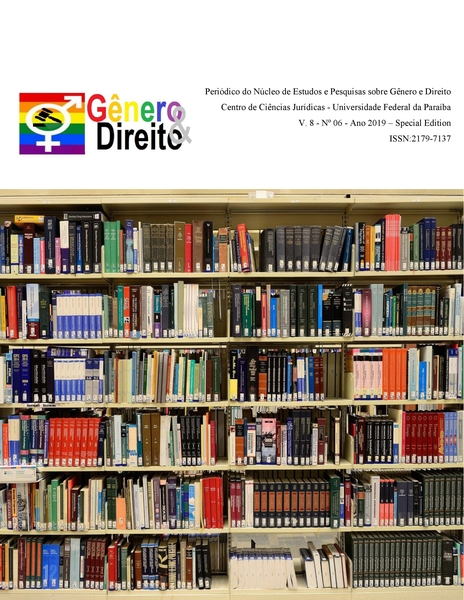INSTITUTIONALIZING OF PROPERTY RELATIONS IN THE SYSTEM OF NETWORK COORDINATION NEXUS
DOI:
https://doi.org/10.22478/ufpb.2179-7137.2019v8n6.49204Palavras-chave:
property, property relations, institutional structure, network structure, triple helix, property relations, innovation systemResumo
There is an active development and use of the principles and research tools of the institutional approach in modern economic science. It allows establishing the relationships that exist between the economic, political and social elements of the system, expanding the boundaries of economic life. The institutional environment determines the goals, functions and dynamics of interaction in property relations. Thus, it appears the effectiveness of functioning of its various forms, which will depend on the institutional structure of management as a system of norms and rules that determine the configuration of property rights, together with coercive instruments. The article considers the approach from the theory of constructivism, which describes the structural features of property relations, taking as a basis the system of network coordination of relations. Formation of a network structure and a new, non-hierarchical way of coordinating ties reflects new economic realities associated with the strong interdependence of property subjects. Formation of a knowledge economy, development of globalization, integration of property subjects have led to the accelerated development of innovations, to a new quality of property relations. Innovations are supported by a huge agglomeration of social, innovative, intellectual and financial capital, which forms the emergence of “innovations in innovations” and determines the relevance of studying the system of network coordination of relations.Downloads
Não há dados estatísticos.
Referências
Mokichev S.V., Mokichev S.D. Razvitie innovatzionnoj kooperatziy kak uslovie transformatziy struktury sobstvennosti [Development of cooperation as a condition for transformation of ownership structure] / Jurnal Economichescoj Teoriy. 2012. №3. p.27-38.
Andersson T, Schwaag-Serger S, Sörvik J, Wise E. Cluster Policies Whitebook. IKED - International Organization for Knowledge Economy and Enterprise Development, 2004. P. 266.
Anderson, J & Narus J (1998) Business Marketing: Understand What Customers Value / Harvard Business Review, Nov/Dec98, Vol. 76 Issue 6, p53-65.
Demsetz H. Toward a Theory of Property Rights / The American Economic Review, Vol. 57, No.2, Papers and Proceedings of the Seventy-ninth Annual Meeting of the American Economic Association. (May, 1967), pp. 347-359.
Gibbons R., Farrell J. Cheap Talk about Specific Investments / The Journal of Law, Economics, and Organization, Volume 11, Issue 2, October 1995, Pages 313–334.
Hasumi Y. Roles of International Organizations and the EU in Governing the Global Economy: Implications for Regional Cooperation in Asia / The Third EU-NESCA Workshop, Korea University, May 2007.
Mokichev S.D., Mokichev, S.V., Gerasimova V. Nano-economics In a National System of Innovation / Procedia Economics and Finance, 2013. p. 288-297.
Mitchell A. It's Now a Matter of Trust / Marketing Business, No33, April, 2001.
Riker W. H., Itai Sened. A Political Theory of the Origin of Property Rights / American Journal of Political Science, Vol. 35, No. 4, 1991. p.951-969
Tapscott D., Anthony D. Williams, Wikinomics: How Mass Collaboration Changes Everything / New York: Penguin, 2007, 320 pp.
Teece David J. Managing Intellectual Capital: Organizational, Strategic, and Policy Dimensions / Oxford University Press, 2002. ISBN-13: 9780198295426
Andersson T, Schwaag-Serger S, Sörvik J, Wise E. Cluster Policies Whitebook. IKED - International Organization for Knowledge Economy and Enterprise Development, 2004. P. 266.
Anderson, J & Narus J (1998) Business Marketing: Understand What Customers Value / Harvard Business Review, Nov/Dec98, Vol. 76 Issue 6, p53-65.
Demsetz H. Toward a Theory of Property Rights / The American Economic Review, Vol. 57, No.2, Papers and Proceedings of the Seventy-ninth Annual Meeting of the American Economic Association. (May, 1967), pp. 347-359.
Gibbons R., Farrell J. Cheap Talk about Specific Investments / The Journal of Law, Economics, and Organization, Volume 11, Issue 2, October 1995, Pages 313–334.
Hasumi Y. Roles of International Organizations and the EU in Governing the Global Economy: Implications for Regional Cooperation in Asia / The Third EU-NESCA Workshop, Korea University, May 2007.
Mokichev S.D., Mokichev, S.V., Gerasimova V. Nano-economics In a National System of Innovation / Procedia Economics and Finance, 2013. p. 288-297.
Mitchell A. It's Now a Matter of Trust / Marketing Business, No33, April, 2001.
Riker W. H., Itai Sened. A Political Theory of the Origin of Property Rights / American Journal of Political Science, Vol. 35, No. 4, 1991. p.951-969
Tapscott D., Anthony D. Williams, Wikinomics: How Mass Collaboration Changes Everything / New York: Penguin, 2007, 320 pp.
Teece David J. Managing Intellectual Capital: Organizational, Strategic, and Policy Dimensions / Oxford University Press, 2002. ISBN-13: 9780198295426
Downloads
Publicado
2019-11-26
Como Citar
D. MOKICHEV, S. .; F. ZULFAKAROVA, L. .; M. VAKHITOVA, T. . INSTITUTIONALIZING OF PROPERTY RELATIONS IN THE SYSTEM OF NETWORK COORDINATION NEXUS. Gênero & Direito, [S. l.], v. 8, n. 6, 2019. DOI: 10.22478/ufpb.2179-7137.2019v8n6.49204. Disponível em: https://periodicos.ufpb.br/ojs/index.php/ged/article/view/49204. Acesso em: 2 abr. 2025.
Edição
Seção
Seção Livre

